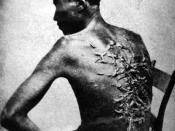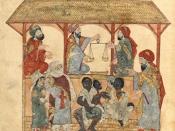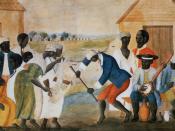To the plantation owner, the abundant land of America was useless without sufficient labor to work it. To the plantation owner, without slavery, the economy of America would have vanished. Slavery was terrible for men, but it was far more terrible for women. Such a strong and powerful statement shows some direct evidence of the suffering of enslaved women, as told to us by Margaret Walker in "Jubilee". African Americans carried a huge burden because of slavery, but black women, like Vyry, had to carry a double burden because of their biological makeup. To be a black woman in slavery was absolutely the lowest point in society, for an enslaved woman, it was an experience of emotional, mental, and physical anguish. Vyry not only showed the reader her emotional, mental and physical anguish, she also showed her strength and perseverance. It was her life and longing for freedom that drove her.
"Is life so dear or peace so sweet as to be purchased at the price of chains and slavery?" (Henry).
The warm climate, boundless fields of fertile soil, long growing seasons, and numerous waterways provided favorable conditions for farming. The richness of the South depended on the productivity of the plantations. With the invention of the cotton gin, expansion of the country occurred. This called for the spread of slavery. Their white owners owned and controlled slaves, from birth to death. Vyry's mother was a slave, her father the slave master. Vyry was a woman, born into slavery. Black men, women, and children toiled in the fields and houses under horrible conditions. After the death of her mother, Vyry was put to work in the big house as Miss Lillian's personal servant. She has a difficult time adjusting, often made mistakes and was harshly punished by Big Missy, the...



"Slavery and the Road to Freedom"
Transitions could use some work. Thorough, informative, and interesting to read.
0 out of 0 people found this comment useful.